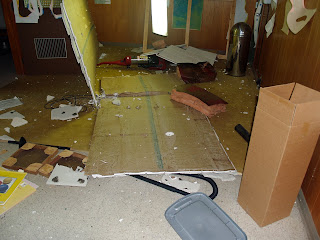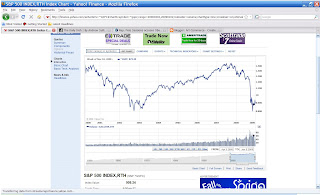Sunday, May 31, 2009
Seduced
Nobody.
The "Green Porno" series of short films is extraordinary, as are the sets and costumes designed by Andy Byers.
More here.
Living in a red state can have its rewards
"He cooks that crystal meth because the shine don't sell.
You know, he likes the money, and he don't mind the smell."
Anybody who can say the song he's performing goes out to the First United Crystal Methodists of Durant Oklahoma is okay in my book. Especially when he follows that with a line about a hard-on like a bois d'arc fence post.
Tuesday, May 26, 2009
I said it before, and I'll say it again
Recently we were uplifted when the president informed Chrysler’s secured creditors that they had agreed to donate their ownership stake in the company to the United Auto Workers.Did this in fact happen? Well, no, not exactly. Setting aside the elision of secured credit and any putative ownership stake (the guys who got short shrift owned Chrysler debt, not equity -- bonds, not shares), there's the issue of what the UAW gave up: 50% of its retirees' health care fund in exchange for their equity stake in the company. Nobody gave them dick. They bought what they own. With their money.
Meanwhile, guys at hedge funds like Schultze Asset Management and Stairway Capital Management, who wouldn't agree to terms reducing their take in the Chrysler meltdown, put their interests ahead of what is best for the company and for the country. One line of reasoning was that the company was worth more as scrap than they'd get from the settlement they were offered. So let tens of thousands of Americans lose their jobs and hold a Chrysler garage sale. After it's all about maximizing investor returns, right?
Bloomberg reported on May 6:
The Chrysler Non-TARP Lenders are as follows, according to the filing: Schultze Master Fund Ltd. of Purchase, New York; Arrow Distressed Securities Fund at the same Purchase address; Schultze Apex Master Fund, at the same address; Uniondale, New York-based Stairway Capital Management II L.P; Group G Partners LP, based in New York; GGCP Sequoia L.P., at the same New York address; Oppenheimer Senior Floating Rate Fund, in New York; Oppenheimer Master Loan Fund LLC, at the same New York address; and Foxhill Opportunity Master Fund LP, based in Princeton, New Jersey.Note that one of their number identifies itself as a "distressed securities fund." They specialize in risky debt. If they bought Chrysler bonds at face value, they plain aren't doing their job. Folks like that buy stuff at a discount. If any other members of that august group paid more than 50 cents on the dollar for the debt they held, I'd be mighty surprised. And yet they refused to settle for less. (The Feds offered 28 cents on the dollar for securities trading between 27 and 28 cents on the buck at the time of the offer, according to Bloomberg, that hotbed of Socialist, Stalinist, Batshit-Maoist ideology)
But I digress. The topic is how abysmally dumb David Brooks is. Consider this from his -- erm -- column today:
These events have heralded a new era of partnership between the White House and private companies, one that calls to mind the wonderful partnership Germany formed with France and the Low Countries at the start of World War II.And this:
During the press conference with health care executives, I don’t even think Obama meant to give away $2 trillion of their money. He was going to give away just $750 billion, but he got carried away by the Era of Responsibility. “The stakeholders behind me have promised to cut costs by nearly 2 percent a year,” the president riffed. (The executives’ lips were like dead worms stretched across mirthless smiles. Their cheeks were like hardened clumps of concrete.) “They have agreed to support the administration’s reform package.” (Coronaries, epileptic seizures all around.) “They have agreed to donate their kidneys in my office right after this ceremony.” (The executives were now flopping about the stage, like a 3-D version of the Heimlich poster.)Har har! German aggression! Donate their kidneys! What a wag!
You know what else is like hardened lumps of concrete? Both hemispheres of David Brooks' brain. In 2004, US spending on health care totaled over 15% of GDP. Think it's gone down since then? Big Pharma is doing just fine, even without two percent of its take. This is from Paul Krugman's blog last year:
Everybody knows that the US spends much more on health care than anyone else, without getting better results. Everyone also knows that health spending has outpaced GDP growth everywhere, thanks to medical progress. What I didn’t realize was just how clearly the evidence shows that the rising trend is steepest in the US. We have the biggest increase as well as the highest level.He was responding to data that showed health care spending's share of GDP jumping from 7% in 1970 to 15.3% in 2004. During the same period, costs in Canada rose from 7% to almost 10%. Last year, the GDP of the US was about $14 trillion; 15.3% of that comes in at $1.989 trillion. Now Big Pharma isn't the whole pie, but when it comes to health care bucks, they certainly get their share. And that share is growing like a tumor.
And yet (back to my David Brooks is stupid theme) the Times's minister of dumbassery speaks of "enhanced negotiating techniques," disembowelment, shackles, Nazism, North Korea's totalitarian state, and Cossacks. The metaphors of violence multiply and surround his (as it were) argument. Eventually they become his entire case.
Brooks can use metaphors of violent coercion. That is what he has to say on the subject of economic policy.
Hey Ho Let's go! Shoot 'em in the back now.
Sunday, May 24, 2009
Nevermind the ceiling, watch out for the bottom

Paul Krugman:
I think there are two big structural changes that we'd want to see. One is we need to reduce the role of the financial sector in the economy. We went from an economy in which about 4 percent of GDP came from the financial sector to an economy in which 8 percent of GDP come from the financial sector, and in which at its peak 41 percent of profits were being earned by the financial sector. And there is no reason to believe that anything productive happened as a result of all of that. These extremely highly compensated bankers were essentially just finding new ways to offload risks on to other people.A financial sector that generates 41% of all the nation's GDP, but fails to do anything productive is not a working system of finance. It is a fraud.As I've written, we need a boring banking sector again. All of this high finance has turned out to be just destructive, and that's partly a matter of regulation. But in the political economy there was also a vicious circle. Because as the financial sector got increasingly bloated its political clout also grew. So, in fact, deregulation bred bloated finance, which bred more deregulation, which bred this monster that ate the world economy.
The other thing not to miss is the importance of a strong social safety net. By most accounts, most projections say that the European Union is going to have a somewhat deeper recession this year than the United States. So in terms of macromanagement, they're actually doing a poor job, and there are various reasons for that: the European Central Bank is too conservative, Europeans have been too slow to do fiscal stimulus. But the human suffering is going to be much greater on this side of the Atlantic because Europeans don't lose their health care when they lose their jobs. They don't find themselves with essentially no support once their trivial unemployment check has fallen off. We have nothing underneath. When Americans lose their jobs, they fall into the abyss. That does not happen in other advanced countries, it does not happen, I want to say, in civilized countries.
And there are people who say we should not be worrying about things like universal health care in the crisis, we need to solve the crisis. But this is exactly the time when the importance of having a decent social safety net is driven home to everybody, which makes it a very good time to actually move ahead on these other things.
More here. (Via Ritholtz)
Friday, May 22, 2009
Spring storms and me



About three weeks ago, we had one of those Toto-I-don't-think-we're-in Kansas-anymore spring storms that occur in this climate from time to time. My wife, our two dogs, a radio, a lamp, and I spent a good deal of the evening sitting in the hallway while the storm raged outside. We heard unusual noises. The dogs made unusual noises, as well. The power failed. Howls and moans occurred. Some of the howls came from the dogs. Some came from the storm. Some came from assorted transformers and power lines.
It was scary.
But the storm passed. And the house held together. In fact, we went to a dinner party at a friend's place later that night. We had great fun eating by candle light, even after the power came back on.
My studio was another matter. It's a building next door to my house. The power of the storm was great enough that the roofing was lifted up and the wind forced rain water through the decking, saturating the ceiling. Waterlogged, it collapsed under its own weight.
No paintings were damaged, though a few minor studies now look rather more aleatory than they did before the event. The situation may be a lesson in using weather maps as sources of imagery (as I have done in recent years). Be careful what you deal with, boy; it may be stonger than you'd anticipated.
 The insurance guys say they'll cover almost all of the cost, and I plan to angle for a little more than they have so far offered.
The insurance guys say they'll cover almost all of the cost, and I plan to angle for a little more than they have so far offered.Meanwhile, I won't be working in that room for a while.
Friday, May 15, 2009
Loaves and Fishes
We have set up a fledgling community garden here in my little town, and that has led to numerous personal interactions and nascent friendships which I'd never suspected would happen.
More than plants can grow in a garden.
I've made friends with numerous stalwarts in the local Methodist Church, for example -- men and women whose worldview is hardly congruent with my own. I've worked with a man named Bob who is a master plumber and with Jim who is a master welder (and county commissioner) and with Lamont who is a master gardener. So many skills, so many people.
Today, I met (or rather re-met) Tim, a massage therapist and psychologist, who determined that he and his wife Frances needed to participate in the project. After some confusion about which plots were still open (our record keeping needs some fine tuning), we got him situated. The other re-acquaintance today was with Ron, the pastor at the local Church of the Nazarene, who wanted a project for his youth group to work on tomorrow during their weekend famine study. Ron and his church volunteered last month for our Big Event work day when they toted bales and slogged through dirt and mulch till our garden was almost ready for planting.
Yesterday, he emailed to ask if there were chores in the garden for his church's youth group to do during their weekend fast in observance of world hunger.
Wow.
Here's what I learned from Ron: the kids in his church will not eat for 30 hours this weekend. They will work to provide food for others during that time. They will earn money from pledges for each hour they fast. The money will be sent to feed the hungry in Rwanda. He told me that his instructions to them were to learn from their hunger, to understand the relationship between the pangs and their spirits, their souls. His asceticism was heart-felt and heartening, not mean-spirited in the least, but generous and loving.
Understand your luck. Understand the suffering of others. Understand how your spirit is part of this world.
It was an interesting -- even enlightening -- discussion. I mentioned the daily fasting of the faithful during Ramadan, the significance of eating to Christian communion, the ritual of the Seder meal for Jews at Passover. All this (and more) leads me to conceive of food not as mere fuel for our bodies, but as highly charged, symbolic stuff for our souls.
We were on the same page.
We found ourselves -- for the moment, at least -- in absolute agreement. A pastor in the Church of the Nazarene and a secular intellectual nodded and said yes to one another out in a garden with nascent tomatoes and sprouting beans and squash blossoms and okra seedlings and piles of mulch. We didn't and don't agree about theology, ontology, cosmogony, cosmology, ontogeny, ontology, phylogeny, or most other -ogonies, ogenies, and -ologies out there. But when it comes to food, we have common ground. More than that, we want to see another path for understanding our connection to the earth, one in which distinctions between our souls and our bodies amount to so much confused thinking.
Much of that path is bound up in eating.
Monday, May 11, 2009
Where did those pig lips get off to?

There they are! I need them for Congressman Pete (I used to be district manager for marketing at Southwestern Bell so I'm an expert on economic realities) Sessions from Dallas. The Dallas Morning News reports Pistol Pete flapping his yap today:
Precisely how a nefarious divide-and-conquer strategy will arise from staggering unemployment numbers and slumping equity values I don't know. Just why an administration with Obama's very high approval ratings would want to divide and conquer anybody I don't know either. Nor can I know the congressman's ability to divine the President's intentions to undermine capitalism, given all the gigabucks he and his have poured into our ailing financial institutions in an effort to save capitalism.Sessions told The New York Times that the administration intends to “diminish employment and diminish stock prices” as part of a “divide and conquer” strategy.
And he asserted that the Obama agenda is “intended to inflict damage and hardship on the free enterprise system, if not to kill it.”
Moreover, blaming current employment numbers and stock prices on an administration which has been in power for less than four months is patently bad faith partisan posturing in a recession that's a year older than that. Below is a screen grab of a chart for the S&P 500 during the previous administration.

Note the precipitous decline at the end of 2008. That stomach-churning drop at the right begins in September, when Bushman Hank Paulson let Lehman fail. And it is most important to remember that in the several years before that fall as much as 40% of all profits reported by US corporations came from financial institutions, companies whose earnings statements we now know involved magical thinking about the valuations of the derivatives like CDOs, CMOs, and CDSs they had on their books. This made their stock valuations a fraud and unreasonably inflated the whole index. That boom in '06 and '07 was made of air. Talk about inflicting damage on the free enterprise system.
So I just visited Pistol Pete's Web site and left him a message about his utter ignorance. I doubt he'll read it, but I had to say something.
The pig lips I reserved for my blog.
Tuesday, May 5, 2009
Another one shuts down
Slocum's Web site features some serious seizure-inducing wall paper, but more than that he's very carefully documented his art and culture activities over the past few years on it. He took a painting class from me back when I taught at UT-Dallas and successfully managed to vault far beyond it after graduating (computer science, summa cum laude). No wonder his Web site offers links to (among other things) numerous Atari hacks, a project to convert 1985 Epson dot matrix printers into musical instruments, and other nerdly items like a stop motion animation made of thousands of screen captures of found homepages.
Over the years, And/Or has featured works by Tom Moody, Cory Archangel, and many other edgy, intelligent artists. The last And/Or show will feature works by Austin artist Chad Hopper.
 Image via the artist's Web site, which is worth checking out, especially for the Roz Chast-meets-Kurt Schwitters pictures.
Image via the artist's Web site, which is worth checking out, especially for the Roz Chast-meets-Kurt Schwitters pictures.
